Best Foods for Freezing and Foods to Avoid Freezing
While some foods you can freeze to preserve their freshness and flavor, others you should avoid freezing to prevent changes to texture and taste. Use this list of freezable foods to reduce food waste as well as save money and time.
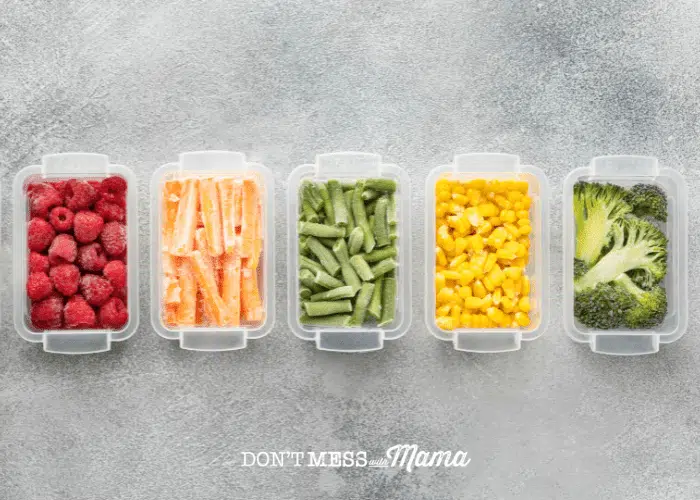
This post contains affiliate links. Please read my affiliate disclosure.
Finding foods that freeze well can make a massive difference to your grocery bills. Not only does freezing help to extend the shelf life of your groceries, but it helps preserve freshness and save you time in the kitchen. I find that having a fully stocked pantry and freezer means I always have food items on hand to make healthy meals even when I’m short on time. It also avoids dealing with hangry teenagers or panic ordering takeout.
However, it can be frustrating if you get it wrong. I don’t know about you, but there have been occasions where I’ve made a lovely meal, frozen the leftovers only to reheat a mushy mess. Not only is it great to know the best foods for freezing but also to learn the ones to avoid. That way, you’ll know what foods to store in the fridge only and which foods you can freeze to enjoy later.
Before I get into the foods that freeze well, I think it’s important to share the benefits of utilizing your freezer. If you’re one of those people who use it for ice cream only or you find yourself throwing away leftovers instead of storing them for later, you need this list. Once you know the best foods for freezing and the reasons why your freezer can save you time and money, it’ll transform the way you plan meals.
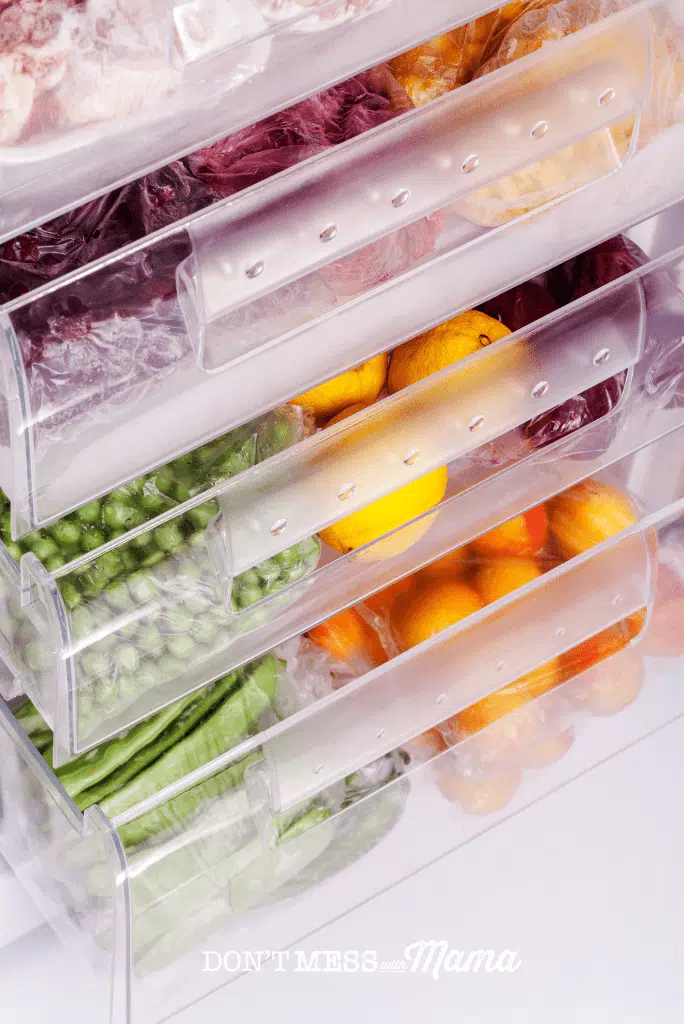
Benefits of Freezing Foods
- Longer Shelf Life: Freezing food can extend its shelf life. This means you can store food for longer without spoilage.
- Save Money: Once you know the best foods for freezing, you can take advantage of sales or bulk buying. You can also freeze leftovers or foods that are nearly at their expiration date – all of which will save you money on groceries.
- Reduced Food Waste: As well as saving money, this list of foods you can freeze will help to reduce your food waste. This is because freezing allows you to preserve fresh produce or leftovers that might otherwise go bad before you have a chance to use them.
- Convenience: Freezing food can make meal prep and family meal planning more convenient. You can prepare meals in advance and freeze them, making it easier to have healthy meals on hand for those busy days.
- Retains Nutrients: It is a common misconception that by freezing foods you are destroying their nutritional value. In fact, the opposite is true. Numerous studies have found that by frozen fruit and vegetables are just as good as fresh. Freezing is actually nature’s way of preserving food and has been used for centuries to retain nutrients and vitamins.
- Improved Food Safety: Freezing food can also help to prevent the growth of bacteria and other harmful microorganisms. This is because as the water in the food freezes into ice crystals, it means the water is no longer available to those microorganisms that need the water to grow.
- Versatile: As there are so many foods that you can freeze including fruits, vegetables, meats and more, it is a great way to preserve and store food.
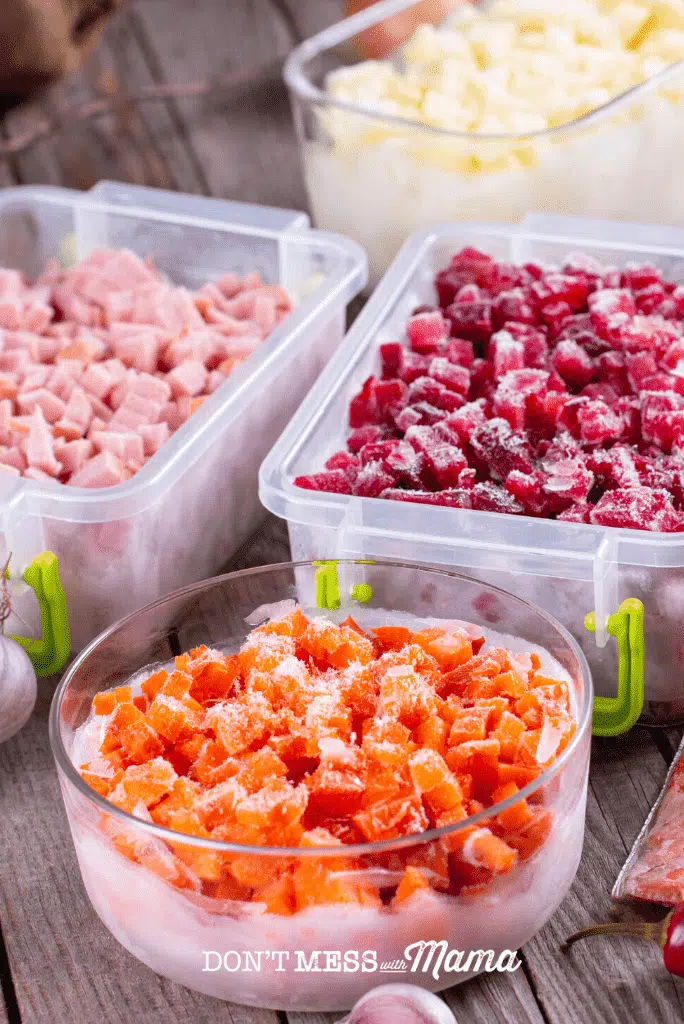
The Ultimate List of Foods You Can Freeze
Fruits and Vegetables
When it comes to the best foods for freezing, fruit and veg should be high on your priority list as almost all produce can be frozen. Not only are they expensive, but fresh produce has a short life span so freezing will benefit both your grocery bills and your health.
With a freezer full of prepped fruit and veg there is no excuse not to fit more into your diet. Whether you use frozen fruits for a morning smoothie, or turn those veggies into soup, they are the best foods for freezing when you are in need of boosting your immune system or simply want a healthier diet.
Did you know you can also freeze vegetable peels and scraps? Save them in a bag in the freezer and once full, use them to make your own homemade vegetable broth.
- Berries – eg. strawberries, blueberries, raspberries
- Bananas – overripe, peeled and sliced. Ideal for banana bread or smoothies.
- Mangoes – peeled and diced
- Apples – peeled and sliced
- Peaches – peeled and sliced
- Pineapple – chunks
- Melon – chunks
- Avocado – pureed with lemon juice
- Broccoli – blanched
- Carrots – blanched
- Cauliflower – blanched
- Green beans – blanched
- Peas – blanched
- Corn – blanched
- Spinach – blanched
- Kale – blanched
- Onions – chopped
- Pumpkin – peeled and chopped
- Squash – peeled and chopped
Tips for Freezing Fruit and Vegetables
There are two vital tips to remember for freezing fruit and vegetables. Firstly, make sure to wash your produce thoroughly to remove any garden soil as it is a source of bacteria. I like to use a natural produce wash when necessary.
Secondly, blanching vegetables before freezing helps to retain their color and nutrients. Freezing without blanching can make your greens look dull as well as affect flavor and texture.
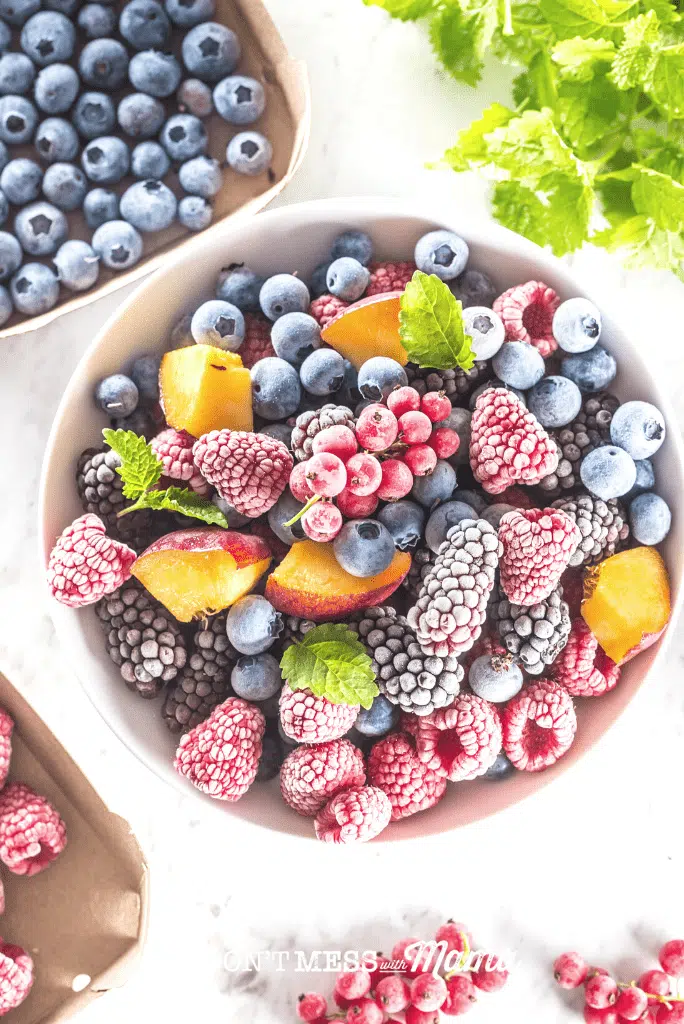
Bread and Baked Goods
I also consider bakery items some of the best foods for freezing as it’s always handy to have a stock of baked goods for those unexpected visitors, lunchboxes or as a mid-morning pick me up. Since my family is gluten free and we make a lot of our own bread, I find that its common for gluten free baked goods to not stay as fresh for as long as those with gluten. I also find they can dry out quicker too. This makes freezing an ideal way to preserve after baking.
Simply wrap items in plastic wrap, place in airtight container (or a Ziploc bag) and freeze for up to 3 months.
On the topic of baked goods, did you know you can store flour in the freezer too? Flour stays powdery when frozen, so you can scoop out what you need as and when, then return it to the freezer. Ideally store in an airtight container to avoid it absorbing moisture or the scent of other frozen items.
- Bread – sliced
- Bagels – sliced
- Muffins
- Brownies
- Croutons
- Unfrosted cakes
- Scones
- Biscuits
- Cooked pancakes or waffles
- Cookies – baked or raw dough
- Pizza dough
Top Tips for Freezing Baked Goods
It’s important you wait until your baked goods are cooled fully before placing in the freezer. Otherwise, the freezing process will trap the excess moisture resulting in a dense, gummy texture once thawed.
I also recommend thawing in the wrapping. This will allow the condensation to form on the plastic wrap, not on the food. You can thaw these items in the refrigerator or at room temperature.
Do not freeze items that contain frosting, glaze or cream as they do not freeze well. Make the items plain, then add these toppings before you serve.
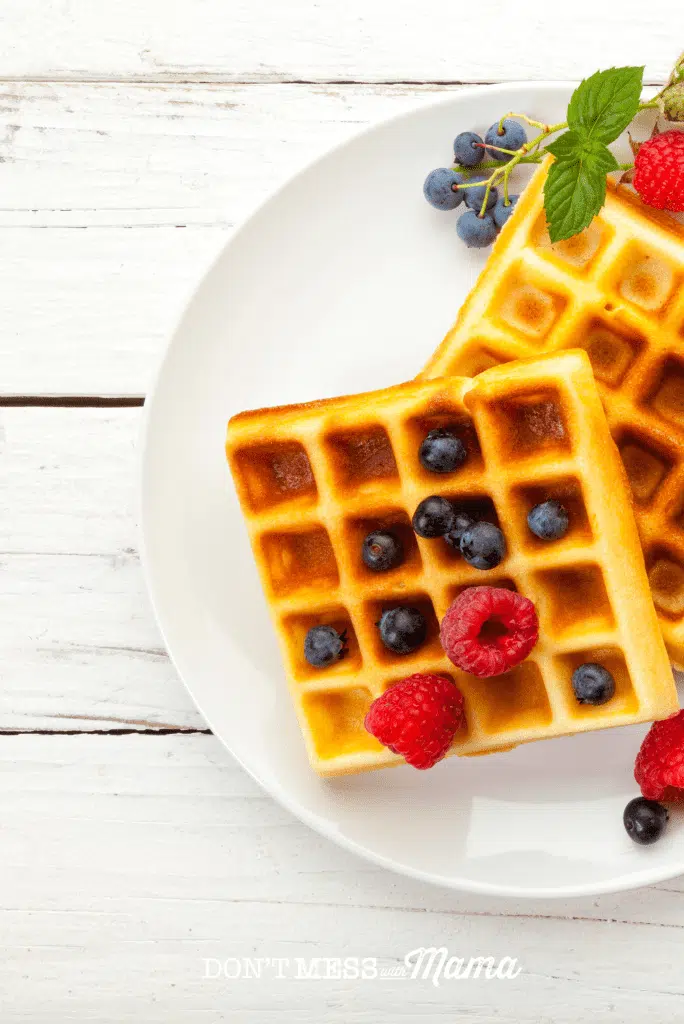
Meat and Poultry
While most of us are aware that ground beef and chicken breasts are some of the best foods for freezing, there are so many other varieties of meat that freezes well. In particular, ground meats including chicken, beef and turkey. They are one of the best foods for freezing as they are high in moisture, have a soft texture and you can portion them up easily.
If you buy meat already frozen and vacuum sealed, it should last in your freezer for around 6 months to a year. If you buy fresh meat, then pat it dry to remove any excess moisture and wrap it tightly in plastic wrap. Press firmly to remove any air bubbles before placing it in the freezer. Don’t forget to label and date your items.
- Chicken breasts
- Ground meat – eg. beef, turkey, chicken
- Steaks
- Bacon
- Turkey
- Pork chops
- Sausages
- Meatballs
- Game – eg. venison, duck, pheasant
Tips f or Freezing Meat And Poultry
Although you can freeze the meat on this list once cooked, meat and poultry will maintain their quality longer if you freeze them raw. This is because some moisture is lost during cooking.
Make sure to portion up any meat before freezing if you do not plan on cooking the entire batch. For thawing frozen meat, it is best to do it in the fridge overnight. It may take a few days for larger items such as a whole chicken.
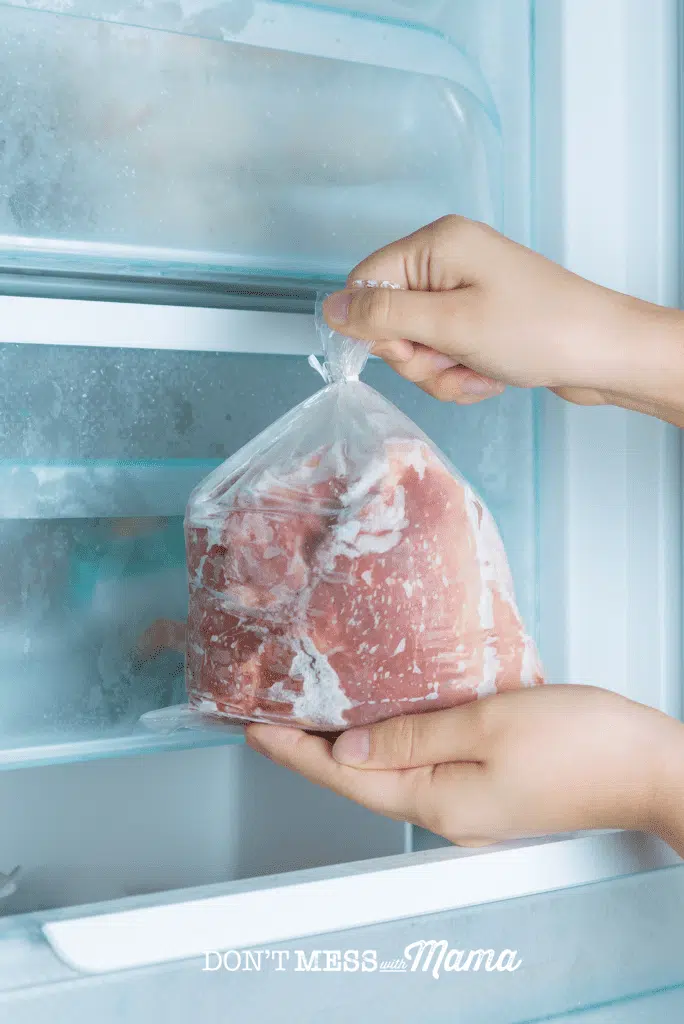
Fish and Seafood
As fish is a low-fat high quality protein, packed with omega-3 fatty acids and vitamins it should be included in your diet at least twice a week. By having some in your freezer its even easier to throw together family favorites like fish tacos or clam chowder when you’re short on time.
Oily fish in particular, freezes well, as does smoked fish. These will keep in the freezer for up to three months. More delicate white fish, such as sole, does freeze well but ideally keep frozen for just a month. This is because some white fish has a higher water content so ice crystals form within the flesh of the fish. This means the fish can become mushy or dry when thawed.
- Fatty fish – eg. mackerel, tuna, salmon and swordfish.
- Large fillets – eg. halibut, monkfish, cod, pollock, haddock.
- Scallops
- Lobster
- Chucked clams
- Squid
Tips for Freezing Fish and Seafood
Although seafood is one of the best foods you can freeze, there are a few tips to keep in mind. Firstly, try to remove as much air as possible from the packaging. This will reduce the risk of freezer burn.
Ideally, freeze the fish as soon as possible as this will minimize larger ice crystals forming. Coat white fish in a protective layer of marinade or a herb infused olive oil before freezing as this will also help to prevent freezer burn as well as preserve texture and taste.
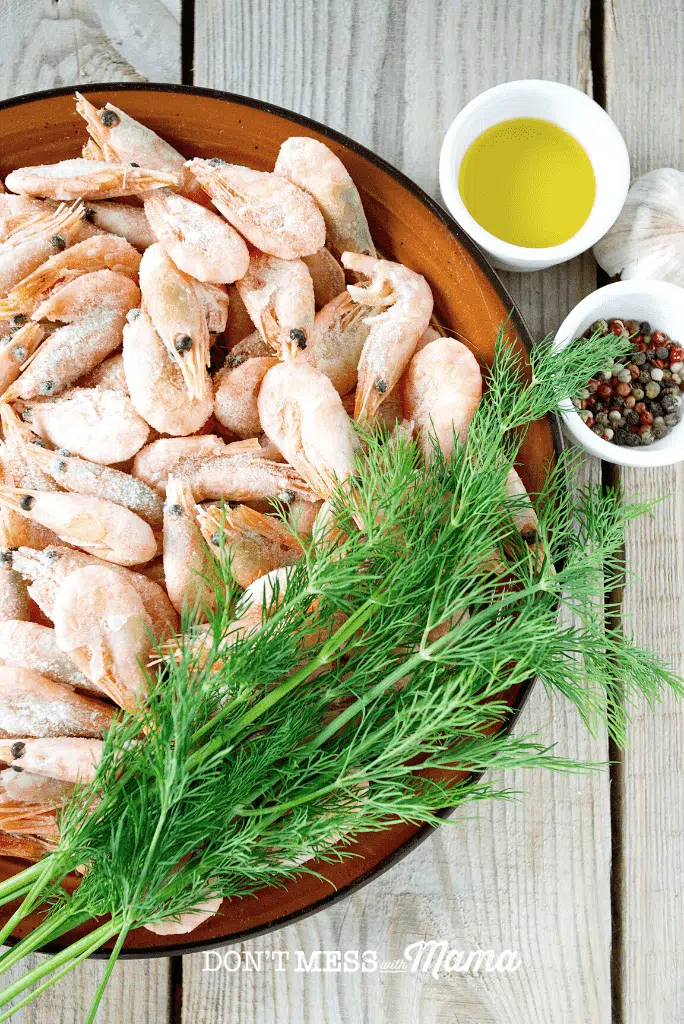
Dairy
Similar to seafood, dairy is an expensive food to waste or store incorrectly. It has a short shelf life so it can be a costly mistake if you forget to use it in time and need to throw it away. It can also be a costly mistake if you freeze some dairy items only to discover they go crumbly, grainy or watery when thawed.
- Hard and semi-hard cheeses – eg. cheddar, gouda, parmesan, Swiss, blue cheese
- Butter – both salted & unsalted. Keep in original wrapping inside a resealable freezer bag.
- Milk – see tips below
Top Tips for Freezing Dairy
Butter tends to be cheapest around the holidays. This is a great time to buy it in bulk then freeze it to use all year round.
If you are freezing milk, remove around a cup from each gallon. This allows room for expansion and prevents the milk carton from bursting when frozen. Once the milk has thawed, its also best to give the carton or jug a thorough shake. This will redistribute the fat and avoid your milk being grainy.
While freezing cheese won’t have much effect on the flavor, it can affect the texture. If you plan on freezing cheese, it’s best to use it for melting (for example on pizza or in mac and cheese) rather than thawing and using it fresh.
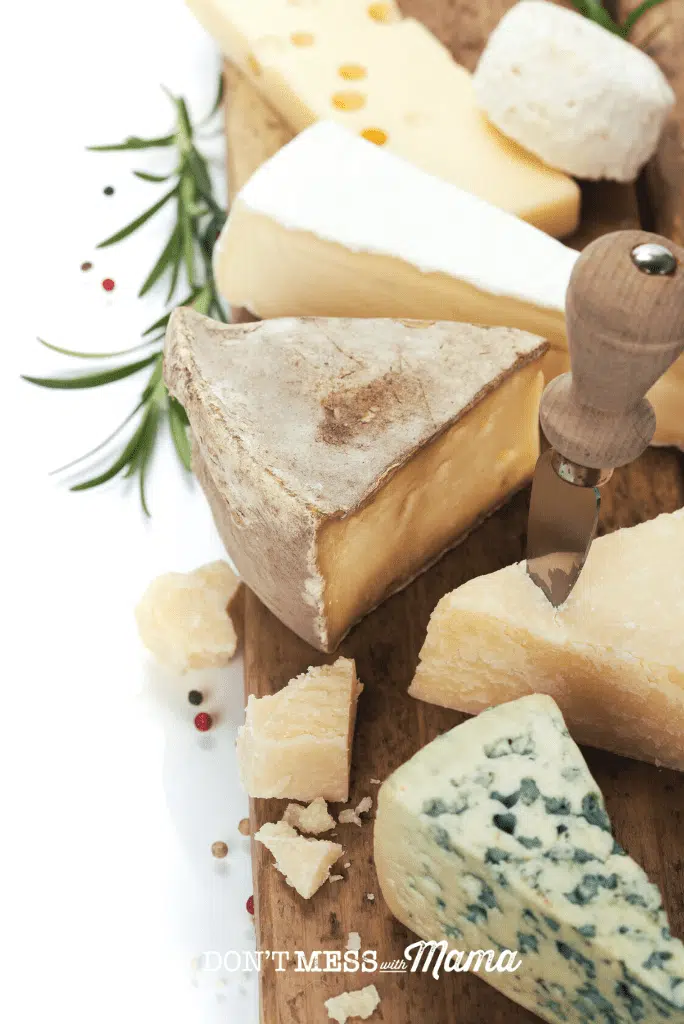
Surprising Foods You Can Freeze
Now that I’ve covered the basic best foods for freezing, you may be surprised to see the following items can be frozen too.
- Citrus rinds – Although citrus fruits do not freeze well, freezing the rinds is a great way to keep citrus on hand if your recipe calls for fresh zest. Simply store them in a ziploc bag.
- Herbs – As one of the easiest foods to grow indoors, it can be difficult storing a surplus of herbs. Luckily sturdy herbs such as rosemary, sage or thyme can be frozen. Add around 2 tablespoons of herbs to each well of an ice cube tray. Cover with water or oil then freeze.
- Pesto – Another one of my favorite foods to freeze is pesto, especially if you’ve made a big batch. It’s easier if you portion it up into an ice cube tray or smaller zip loc bags. It should keep in the freezer for up to 6 months.
- Ginger – Ginger is a great natural remedy for colds and flu so I love having some in the freezer incase sickness should strike. Trim and peel into 2 inch pieces then store in a Ziploc bag in the freezer for up to 3 months.
- Bone broth – Bone broth has so many benefits, it’s great to have some on hand. You can either freeze in an ice cube tray to add cubes into soups or stews or pour into Ziploc bags and freeze flat in the freezer. You can also freeze vegetable discards especially celery, carrots and onions (think the root, shavings, etc.) and bones (chicken, beef, fish) to use to make bone broth in the future.
- Nuts – Packed with unsaturated fatty acids and other nutrients, nuts are one of my favorite snack foods, but did you know they are also one of the best foods for freezing? Simply store in an airtight container and pop in the freezer.
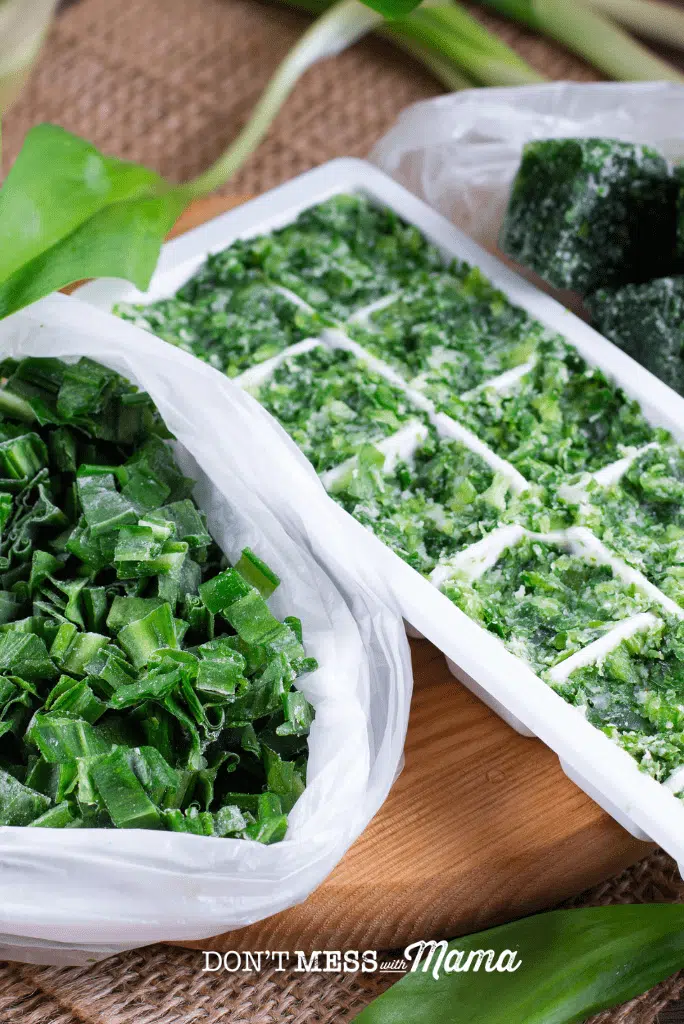
Meals That Freeze And Reheat Well
Now you have a good understanding of foods that freeze well, you’ll also enjoy my round up of over 75 gluten free, freezer friendly recipes. Finding meals that freeze and reheat well will make your meal times stress and waste free. You can batch cook these recipes for the entire week, or if you’re super organized, even the entire month.
A few of my favorite meals that freeze and reheat well include:
- Instant Pot Beef Chili
- Butternut Squash Soup
- BBQ Chicken Pizza
- Instant Pot Beef Taco Meat
- Gluten Free Chicken Strips
How To Reheat Frozen Food
While we’re on the topic of meals that freeze and reheat well, I thought it was important to note that since getting rid of my microwave I have discovered 9 ways to reheat food without out it. These include using the instant pot, on the stove top plus more.
I hope it inspires you that even without a microwave, freezing and reheating food is still not only possible, but helps my family stick to a healthy, fulfilling diet even on those days when life can get in the way.
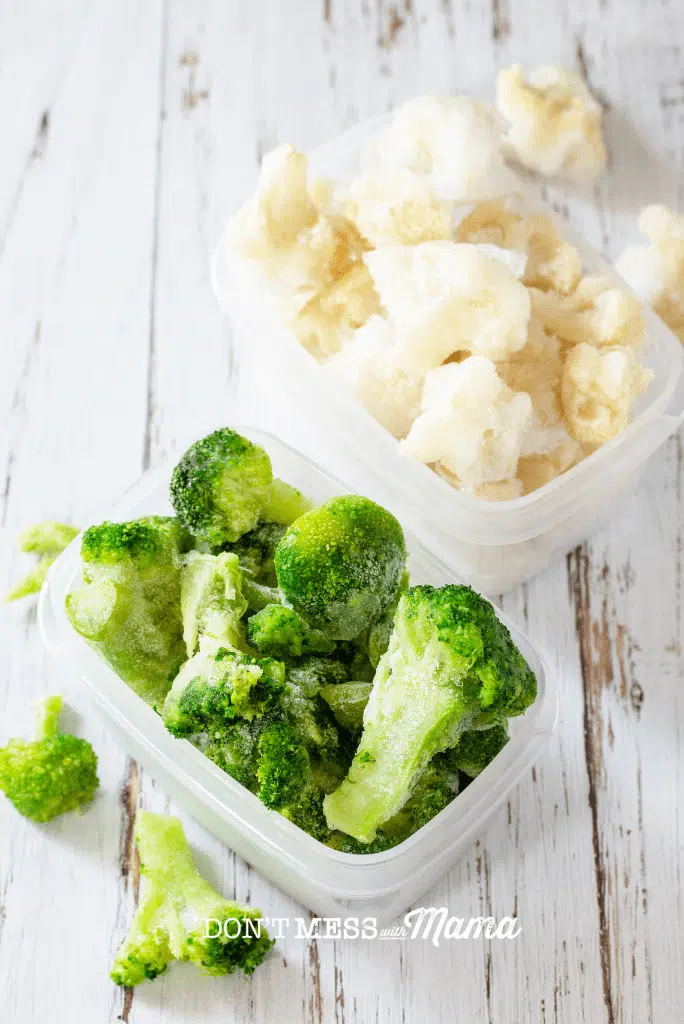
Foods That Do Not Freeze Well and Why
As you can see there are so many foods you can freeze, however there are some foods that I would not recommend storing in the freezer as it will drastically change the taste, texture, or quality. Not only that, some foods are more prone to bacterial growth when frozen and thawed. This can increase your chance of food-borne illness.
- Eggs in their shells: You can freeze eggs or just the yolk/whites individually if you crack them into a freezer safe container, but do not freeze eggs in their shells. The liquid inside will expand when frozen. This causes the shell to crack which will let air and bacteria inside.
- Raw vegetables with high water content: Vegetables such as lettuce, cabbage, andn cucumbers do not freeze well. They will become limp and lose their crisp texture when thawed due to the high water content.
- Cooked pasta and rice: Of all the foods that you can freeze, cooked pasta and rice should be avoided. They become mushy and lose their texture entirely when frozen and thawed.
- Cream-based soups and sauces: For example, if you’re making a large batch of creamy sweet potato soup and want to freeze it, add a drizzle of cream when you serve it. The cream can separate and become grainy when frozen and thawed, so omit until ready to serve.
- Mayo or mayo based dishes: This includes family favorites such as egg salad, potato salad or coleslaw. If your recipe contains mayo or sour cream it may separate once frozen and thawed. The taste will be effected too. Luckily, my loaded baked potato salad is so good, there’s never any leftovers to freeze anyway.
- Fried foods: We all love the air fryer nowadays, but fried foods (even air fried) don’t always freeze well. They will lose their crispy texture and instead become soggy once frozen and thawed.
- Soft cheeses: Hard or semi-hard cheese is one of the easiest foods to freeze, but avoid soft cheese. Varieties such as brie and camembert will change once frozen and instead become crumbly and grainy.
- Fruits with high water content: Similar to the vegetables mentioned above, fruits such as watermelon or citrus fruits that have a high water content do not freeze well. They will become mushy and inedible once defrosted.
It’s important to note that while these foods may not freeze well, there may be some exceptions and variations depending on the type of food and how it is prepared.
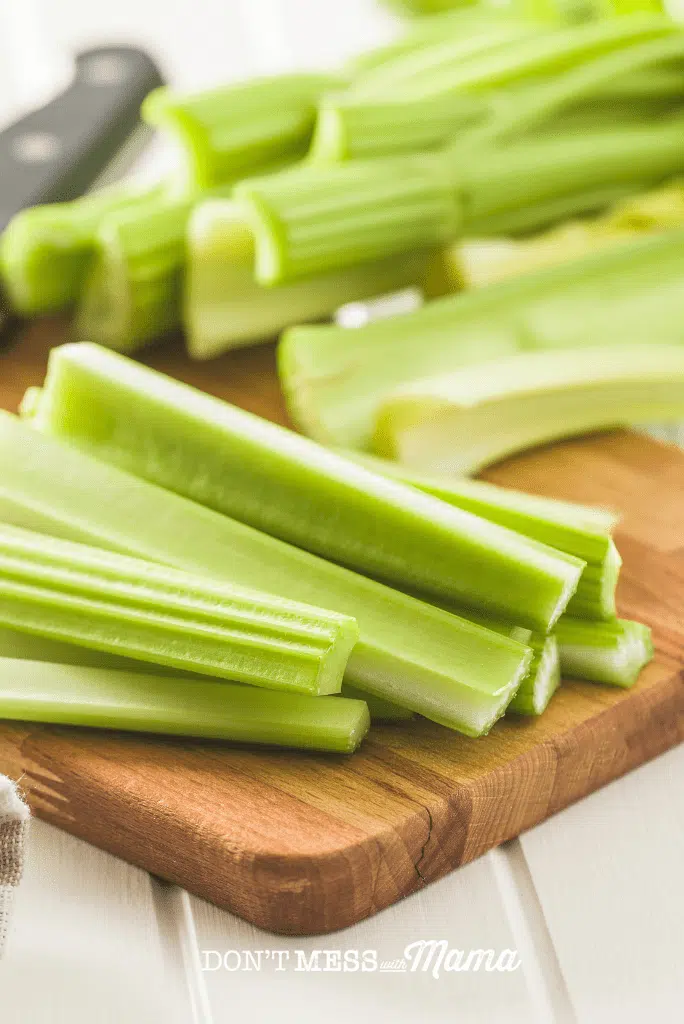
Hopefully this guide has inspired you to waste less food and consider using your freezer more often. Armed with the knowledge of what foods you can freeze, you will not only save money and time at the grocery store, but you can ensure your family eats a healthy, balanced diet.
More Kitchen Guides You Might Like
- 75+ Gluten Free Freezer Meals, Snacks and Desserts
- How to Clean an Instant Pot
- 20 Instant Pot Meals in 30 Minutes or Less
- Instant Pot Cooking Times
- 8 Slow Cooker Benefits That Will Save You Money
Are there more foods that freeze well to add to this list? Let me know in the comments. You can also FOLLOW ME on Facebook, Instagram and Pinterest.
Sources:
https://nchfp.uga.edu/how/freeze.html#gsc.tab=0
https://nchfp.uga.edu/how/freeze/dont_freeze_foods.html

This article was so well done and such great information. Thank you so much!
Wow thanks for the great tips and indepth take. I constantly have frozen bananas and yes pesto freezes so so well. I just made a batch of meatballs to freeze. So yes freezer is our friend. Great tip on freezing citrus rinds which I never thought to do before!
Loved this in depth article! I will have to try freezing fresh meat.
Hello Tracey,
I just wanted to let you know you can freeze cabbage just wash it and cut it pat it dry then freeze it , Will last for 3 months and cook just great and taste awesome.
Thank you for sharing!